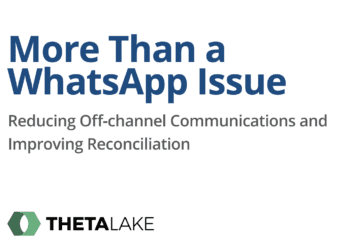The Long-term Strategic Advantage
With the GDPR implementation deadline quickly approaching, many organizations are extremely focused on meeting specific regulatory requirements. However, GDPR is just the starting line. Here Brian Lee and Stephanie Quaranta highlight how compliance and privacy executives can plan past simply conforming with the requirements, and use GDPR as a long-term strategic opportunity to build sustainable policies and procedures.
Co-authored by Stephanie Quaranta
With enforcement of the EU’s General Data Protection Regulation (GDPR) fast approaching, most compliance and privacy executives are putting their heads down and making sure they are GDPR compliant by the May 2018 deadline. For many executives, the number of tasks to accomplish can seem endless.
This has contributed to the feeling that the GDPR enforcement date is a “finish line” of sorts. This makes sense, as many organizations have spent significant amounts of time building or evolving their privacy programs to ensure GDPR compliance, and the May deadline is as a light at the end of the tunnel.
Yet viewing GDPR as a finish line overlooks an important truth: GDPR is a rare strategic opportunity for compliance and privacy executives to cement the privacy program as a part of business operations. More accurately, GDPR is a starting line. Research from CEB, now Gartner, has identified three opportunities GDPR creates an opening for organizations to accomplish:
Opportunity #1: Establish Program Value
Compliance and privacy executives have struggled to define and demonstrate the value of an effective privacy program in the eyes of key stakeholders. This can limit the program’s ability to contribute to key initiatives. GDPR, by stipulating requirements for how privacy should be managed and instituting significant penalties for falling short, can serve as a pivotal moment for privacy executives to make the business case for major initiatives such as building a comprehensive data map or launching a data minimization campaign. Not only are these ideas directly in support of GDPR requirements, but they also help privacy teams improve the targeting and impact of all risk management activities. Privacy should use GDPR as an opportunity to secure the buy-in, resourcing and board visibility the program needs to be effective.
Opportunity #2: Drive Consensus on the Organization’s Approach to Data
As the value and strategic importance of data grows, organizations will continue to collect more data, grant broader access to both employees and third parties and increase the use of data to guide important business decisions. Though organizations that leverage data in this way can expect to see significant revenue and productivity gains, this increasing reliance on data can prove problematic if it is not guided by a broader strategy.
With GDPR introducing new and more stringent expectations around important issues such as data subject consent, it is more important than ever for privacy to ensure that the business does not take on unnecessary risks. To do that, compliance and privacy executives must work with business and functional partners to create a set of principles that guide the collection, use and retention of high-risk information. Organizations must define their approach to data and to protecting privacy, creating a golden opportunity for privacy to prove its mettle as a strategic advisor that can help the business secure real gains.
Opportunity #3: Make Privacy a Part of Business Operations
GDPR introduces explicit privacy-by-design and data protection by default requirements for the first time. Compliance and privacy executives should seize this opportunity to take their program from on that is “bolt-on” to business processes to a natural part of business operations. Though many privacy executives report feeling confident in how privacy is embedded in technical requirements, such as app or software developments, most report feeling less confident about business processes such as third-party selection and onboarding or data analytics.
GDPR provides privacy executives with an opportunity to ensure privacy is a part of these business processes as well. Privacy should begin by expanding the reach of the Privacy Impact Assessment — currently, only 55 percent of high-risk processes receive one. Privacy considerations should also be embedded in other process steps, such as third-party RFPs or new product development stage gates. These point-in-time assessments or controls should then be supplemented by ongoing monitoring not only of privacy risk but of business changes as well, to ensure privacy is aware of new or evolving business need.
Conclusion
Once the organization has done the hard work of building a data strategy and making privacy a key element of business operations, there is an opportunity to further demonstrate the value of privacy to the organization by marketing this work to their customers. Customer trust in organizations is at a low point. In fact, 87 percent of consumers believe adequate safeguards are not in place to protect their personal information. Even more troublesome, 79 percent of consumers say they would be unlikely to share data with companies they do not trust, creating a significant business risk as organizations increase their reliance on this very data.
Privacy can work with corporate communications and other internal teams to ensure that the organization’s commitment to privacy is a visible part of the organization’s identity, serving as a market differentiator and a growth engine.
By serving as a driving force to develop strong privacy practices, GDPR can not only help privacy programs mature but can help organizations grow as well, proving that it is so much more than a finish line.



 Brian Lee is an experienced lawyer and Managing Vice President at
Brian Lee is an experienced lawyer and Managing Vice President at 






